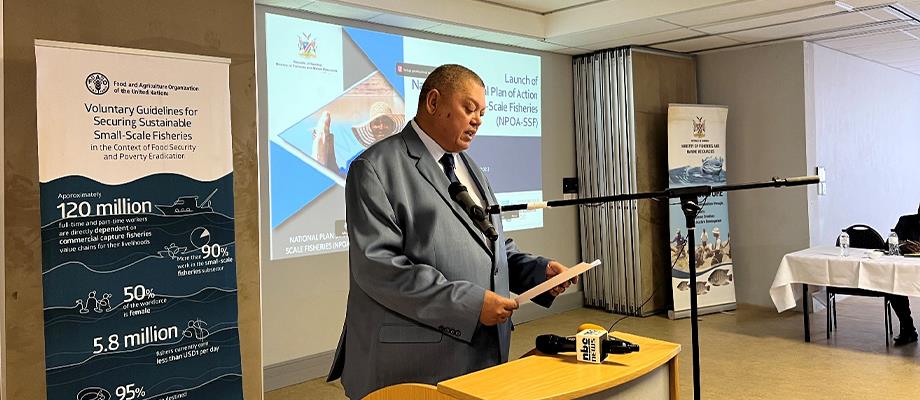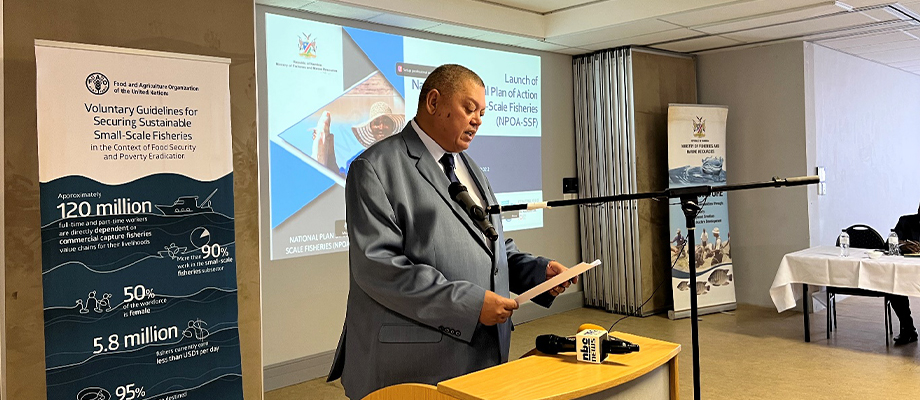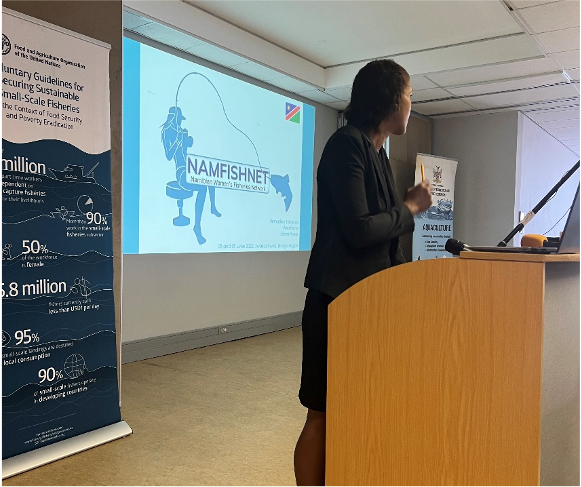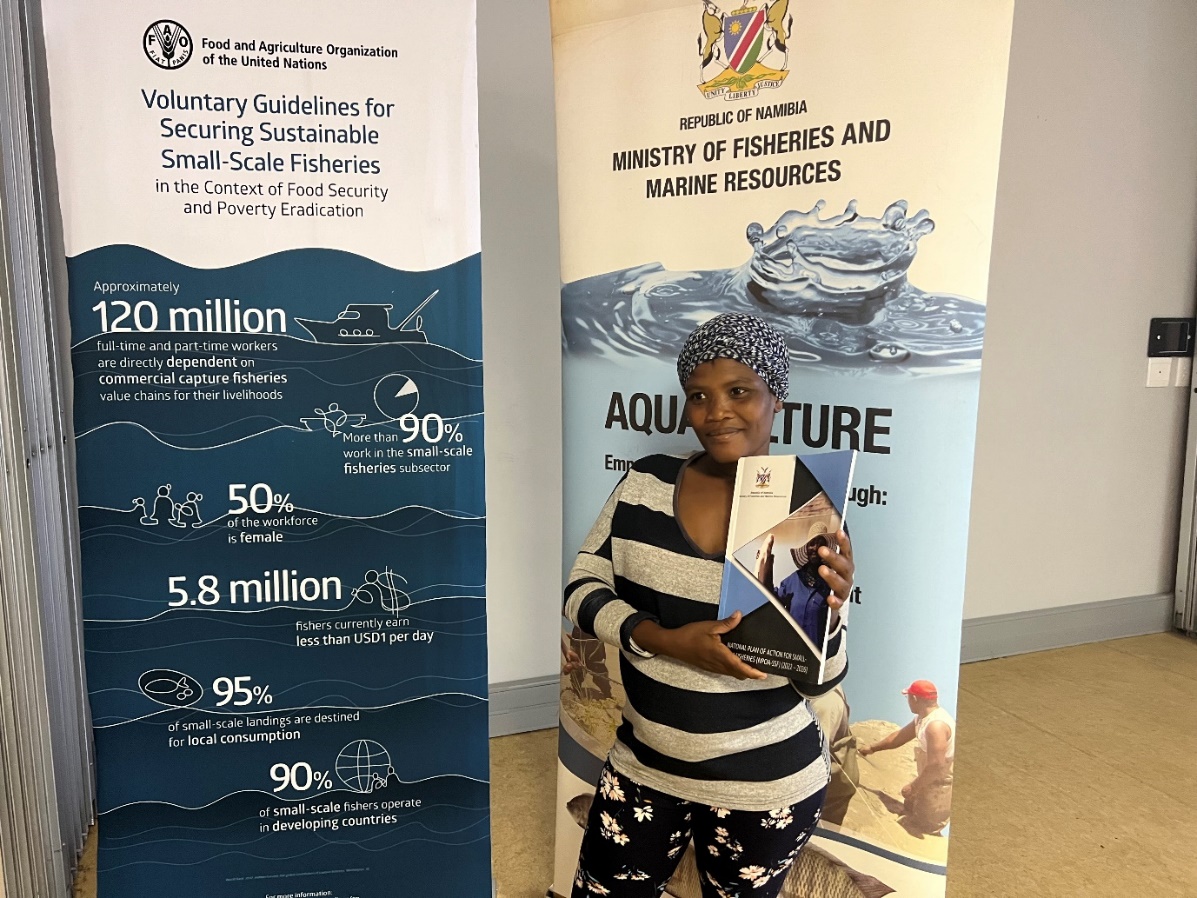Namibia launches national plan of action for Small-Scale Fisheries (2022 TO 2026)

 Hon Derek Klazen, the Minister of Fisheries and Marine Resources launching Namibia’s National Plan of Action for Small Scale Fisheries on 09 June 2022 in Swakopmund, Erongo Region. |
The Government of Namibia, through the Ministry of Fisheries and Marine Resources launched Namibia’s National Plan of Action for Small-Scale Fisheries (NPOA-SSF) on Thursday, 09 June 2022. The launch took place at the coastal town of Swakopmund and was attended by over 80 participants, including small-scale fisherwomen and men, fish workers, fish traders fish processors and key SSF stakeholders from Namibia, Angola, and South Africa.
The Minister of Fisheries and Marine Resources, Hon Derek Klazen officiated at the event and was joined by key delegates included the Executive Director in the Ministry of Fisheries and Marine Resources, Ms Annely Haiphene, the FAO Country Representative for Namibia Ms Farayi Zimudzi, a representative from the Office of the Governor of the Erongo Region, Hon Neville Andre Itope, the CEO of the Namibia Fish Consumption Promotion trust, Mr Victor Pea and the SADC Fisheries Advisor Dr Motseki Hlatshwayo.
In his key-note address, the Minister emphasized that Namibia adopted the Voluntary guidelines on Securing Sustainable Small-Scale Fisheries (SSF Guidelines) in line with the country’s 5th National Development Plan and the Harambee Prosperity Plan. He reiterated that the NPOA-SSF recognizes the important role that the small-scale fisheries (SSF) sector plays in socio-economic growth; economic transformation and livelihood security by building resilience for small-scale fishers (including fisherwomen, fishermen, youth, persons living with disabilities, fish workers, fish traders and fish processors - the majority of whom happen to be previously disadvantaged riparian and coastal communities).
 |
The Minister stressed that the NPOA-SSF advocates for inclusivity, promotes social equity and provides empowerment opportunities for small-scale fishers, by advocating for equitable fisheries resource distribution. He called for increased investments in Namibia’s small-scale fisheries sector, through targeted resource mobilisation efforts at the National level.
The Executive Director, Ms Annely Haiphene expressed that the NPOA-SSF provides special consideration and specific actions to move the SSF sector from an under-estimated sector, to one which recognizes the rights of small-scale fisherwomen and men to play a significant role in mainstreaming socio-economic development with a view to ensure community upliftment, national food and nutrition security.
The FAO Country Representative, Ms Farayi Zimudzi called on intensification of Research and Development (R&D) and investments to support growth in the small-scale fisheries sector and to increase the sector’s contribution to the betterment of rural communities’ livelihood as well contribution to the country’s GDP at large.
During the NPOA-SSF development process, a legislative policy review on the alignment of Namibia’s Fisheries Policy against the SSF guidelines was undertaken. The review recommended the development of a Small-Scale Fisheries Policy for Namibia, to place a strong emphasis on improving community governance in small-scale fisheries; support human dimensions and balance conservation and sustainable resource use.
 Hulda Swartbooi, a small-scale fisherwoman from the Snyfontein fishing community validated and attended the launch of the NPOA-SSF together with over 60 small-scale fisherwomen and men, fish workers, fish traders and fish processors from Namibia, Angola, and South Africa. |
Emerging evidence positions Namibia’s Small-Scale Fisheries sector as an important contributor to the local economy. Annually, Namibia’s Inland Small-Scale fisheries sub-sector employs an estimated 45,000 Namibians in seasonal and full-time jobs and provides an estimated 10,000 metric tonnes of fish valued at N$ 230 million; whereas the Coastal Small-Scale Fisheries subsector employs over 1,500 seasonal and full-time workers and contributes approximately 3000 metric tonnes at a value of N$ 27,6 million to the local economy.
At the same occasion, the AWFISHNET Namibia Chapter was launched by the Namibian Women’s Fisheries Network (NAMFISHNET). NAMFISHNET is an NPOA-SSF enabled network of small-scale women fishers, traders and processors who want to organise themselves in order to participate mover visibly in the SSF sector.
The NPOA-SSF was validated by small-scale fisherwomen, men, fish traders, fish workers and fish processors who were part of the one- and a half year long development process. The participation of small-scale fisherwomen and men from Angola and South Africa was supported by the BCC Climate Change Project and was aimed at promoting regional lessons learning towards capacity building for small-scale fishers in the Benguela Current Region.
Initial investment in the five-year NPOA-SSF is estimated at just over N$ 19 million (U$1,23 million).
